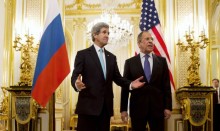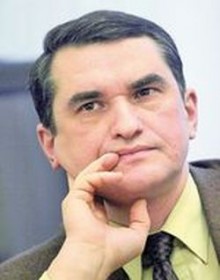Another round of negotiations in Paris between the US Secretary of State John Kerry and Russia’s foreign minister Sergey Lavrov ended with a failure. Both parties could not reach an agreement in settling the Ukrainian question. Let us remind that this time negotiations between representatives of the United States and Russia were resumed at the initiative of Russia’s President Vladimir Putin, who called Barack Obama last Friday, when the latter was on an official visit to Saudi Arabia.
By the way, this call was preceded by a statement by the US president in the Kremlin’s address to the effect the diplomatic settlement of the Ukraine-Russia crisis is possible only if Russia withdraws its troops from the border with Ukraine and “will not take any steps that could further violate the sovereignty and territorial integrity of Ukraine.”
At the press conference, Kerry said that there was no breakthrough in the negotiations after four hours of “frank” conversation. He also emphasized that there will be no decisions made on the future of Ukraine without the participation of the new Ukrainian government. “Ukrainians will choose their future themselves. We did not discuss it tonight, because it would have been dishonest due to the absence of a representative of Ukraine,” said the US Secretary of State.
Sergey Lavrov said during a separate briefing that Moscow and Washington have an intention to cooperate with the Ukrainian government on the protection of rights of Russian-speaking citizens of Ukraine. As the media notify, Russia did not offer anything new during the negotiations. The terms remain the same: the federalization of Ukraine, Russian as the second official language, and the neutral status of the country, which must be stipulated by the Constitution.
The Day addressed the former Ambassador of Ukraine to the United States Oleh SHAMSHUR with a request to comment on the meeting between Kerry and Lavrov and explain the fact that the last phone call between the presidents of Russia and the US was initiated by Putin, who proposed to find a diplomatic solution to the Ukrainian crisis.
“This means only one thing: international isolation and sanctions against Russia start working. There is no other explanation for Putin’s call and Lavrov’s intention to carry out negotiations. As for the negotiations between Lavrov and Kerry, I take them rather cautiously. Russia is an aggressor and the only thing it tries to do during negotiations, in addition to the annexation of Crimea, is to try and impose their agenda on Ukraine. It is relieving that Kerry, judging by the messages that are received, let Lavrov understand that all matters that relate to Ukraine will be settled with Ukraine’s participation. And this is a crucial issue for us.”
Political analyst Berezovets wrote that one of the new Russian offers is to demilitarize Crimea, withdraw Russian troops, introduce joint administration, and hold another referendum. And all this, allegedly, in return for Ukraine indicating its neutral status in the Constitution and assuming obligations not to join either NATO or the EU.
“It is hard to comment upon something that is based on unidentified sources. Even if we believe Berezovets, and even believe that Russia agrees to the demilitarization of Crimea and joint administration, I find the rejection of the EU and NATO membership to be an absolutely unacceptable basis for negotiations. Russia wants to drive us into the area of its interests and impose its own foreign political course. And not only that, they will also try to impose the vector of internal development that is favorable for them in order to keep Ukraine under their influence.”
Do you think it is a shortcoming of our government that they are being not persistent enough in asking for the MAP, so that at a press conference in Brussels Obama said that neither Ukraine nor Georgia are on their way to NATO yet? Do we need to prioritize this topic, NATO membership, before the presidential election, considering the fact that the Budapest Memorandum failed to protect the territorial integrity of our state?
“I have always been and I will be a firm supporter of the idea of Ukraine gaining NATO membership. We must admit that the attitude towards this among NATO members, especially those with significant influence, is far from being unanimous. If for some external political considerations, the incumbent government is not ready to discuss this matter more actively, now is the time to change the views of Ukraine’s population on security issues, on the best ways of provision of Ukraine’s security. And the least that the government can do is to start a frank and honest dialog with the society about NATO, meaning that there are extremely favorable conditions for that now. This must be done.”
By the way, during a roundtable “Temperature of today: diagnosis and prescriptions” we held at our newspaper’s office, former prime minister Yevhen Marchuk said that having given up the third largest nuclear arsenal in the world, Ukraine played a crucial role in the strengthening of the US security. And therefore, we have a right to expect more support from the US, perhaps even signing a defense treaty with it. How can you comment on this?
“I think the best security shield for Ukraine would be NATO membership. If this is impossible to achieve for some reason in the near future, there are other instruments. For instance, bilateral security agreements. But in order to implement such an option, the political will from the United States or other countries (but most likely, from the United States) is required. Undoubtedly, this issue must be viewed on a larger scale. Basically, the security system is destroyed, and the non-proliferation system is gravely undermined, because the Budapest Memorandum turned out to be completely ineffective. That is why not only Ukraine, but other countries that signed the Memorandum (Great Britain, the United States, China, and France) have to think how the guarantees of Ukraine’s security can be provided. If this does not happen in the near future, it will be a catastrophic signal, which will influence the whole system of non-proliferation.”
Since negotiations between Lavrov and Kerry in Paris failed, how do you think can Russia be forced to directly negotiate with Ukraine, so others would not decide the Ukrainian question for us?
“For this, Europe must involve all its means of influence. Only one thing can make Russia stop the aggression and start normal communication with the Ukrainian side: the increase of pressure on Russia. Only the application of systemic and economic sanctions can force the ruling elite of Russia and Putin to evaluate the situation in a more realistic way and establish a contact with the Ukrainian side. It is absolutely clear for me that issues that relate to the internal development of Ukraine and that Ukraine settles independently cannot become an object of negotiations. We do not want to turn into a country that would be formally independent, sovereign, and yet absolutely dependent on Russia.”
COMMENTARY
Dr. Matthew ROJANSKY, Director, Kennan Institute, Woodrow Wilson International Center for Scholars:
“I believe there is an option in the middle: neither acceptance of the illegal seizure of Crimea, nor permanent conflict with Russia. But it requires willingness from Western side to maintain strong and clear objection to Crimea annexation with consequences for relations with Russia, including sanctions. At the same time, there is no reason why Kerry and Lavrov should not negotiate a drawdown of Russian forces on Ukraine’s borders and discuss overall situation in Ukraine. Federalism may be Russia’s preferred outcome, yet anything that dismantles Ukraine’s sovereignty will be unacceptable to the majority of Ukrainians so it cannot simply be imposed by outside powers. Probably smarter is to focus on decentralization of power in practical and small steps, with minority rights guaranteed by power ministries in hands of strict professionals.
“About Budapest memorandum, the problem is not whether USA or others owe Ukraine security on a moral level. This is now irrelevant because Ukraine has lost its security and there was not a realistic option for Western intervention. The problem is what can be done that actually helps the situation. It should be clear that Western military action in defense of Ukraine’s territory will give Putin the excuse for a wider invasion. This would be a nightmare for Ukraine. Best USA can do is show Russians their actions will have consequences and help Ukraine assert control over its domestic situation and implement wise policies so that there are no excuses for Russian intervention. Ukraine can defend itself, but the smartest defense is to avoid the conditions that will invite a further Russian intervention.”









